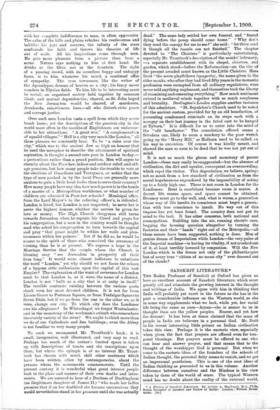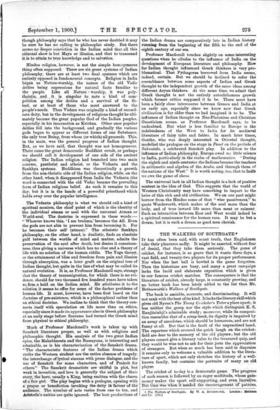SANSKRIT LITERATURE.*
THE Bode] Professor of Sanskrit at Oxford has given us here an excellent account of Sanskrit literature, which must greatly aid and stimulate the growing interest in the thought and writings of India. We agree with him in thinking that India will probably yet exert in the future as she has in the past a considerable influence on the Western world, as she in some way supplements what we lack, while yet, her racial life being the same as ours—Aryan—she is nearer to us in thought than are the yellow peoples. Nearer, and yet how far distant! It has been at times claimed that the mass of people in India are believers in a personal God. Mr. Dutt in his recent interesting little primer on Indian. civilisation takes this view. Perhaps it is the exoteric view, especially when given the fact that prayers are offered even for tem- poral blessings. But prayers must be offered to one wise can hear and answer prayer, and that means that to the thought of the worshipper God is personal. But when we come to the esoteric ideas of the founders of the schools of Indian thought, the personal deity seems to vanish, and we get an impersonal pantheism. This is one of the root ideas of Indian thinking as presented to us in this volume. Another difference between ourselves and the Hindoos is the view taken by them of the world of sense. The typical Western mind has no doubt about the reality of the external world, • A History of Sanskrit Literature. By Arthur A. Mactionell, MA., Ph.D., Soden Professor of Sanskrit and Fellow of l3alliol. London: William Heine- mann. Os.]
though philosophy says that he who has never doubted it may be sure he has no calling to philosophic study. But there seems no deeper conviction in the Indian mind that all this external show is but Maya or illusion, and that to transcend it is to attain to true knowledge and to salvation.
Hindoo religion, however, is not the simple homogeneous thing often supposed. There are six great systems of Indian philosophy, there are at least two final systems which are entirely opposed in fundamental concepts. Religion in India began as Nature-worship, the names of the old Vedic deities being expressions for natural facts familiar to the people. Like all Nature - worship, it was poly- theistic, and . it is singular to note a kind of com- petition among the deities and a survival of the fit- test, or at least of those who most answered to the people's needs. Thus Vishnu was originally a kind of second- rate deity, but in the development of religious thought he ulti- mately became the great popular God of the Indian peoples, especially in his incarnation as Krishna. Other once popular deities fell into the background, and gradually the various gods began to appear as different forms of one Substance, the only true Being, from whom (or which) all proceeds. This, in the main, was the general progress of Indian thought. But, as we have said, that thought was not homogeneous. There came the great democratic Buddhist revolt, or perhaps we should call it development of one side of the ancient religion. The Indian religion had branched into two main courses, pantheist and atheist, or the Vedanta and the Sankhya systems. Buddhism was theoretically a growth from the non-theistic side of the Indian religion, while, on the other hand, when.it disappeared from India the Vedanta (the word is connected with the old Veda) became the prevailing form of Indian religious belief. As such it remains to this day, but it is in the hands of a powerful priesthood which holds sway over the popular intelligence.
The Vedanta philosophy is what we should call a kind of spiritual monism, the chief point of which is the identity of the individual atman or soul with the universal Atman or World-soul. The doctrine is expressed in these words :— " Whoever knows this, 'I am brahma,' becomes the All. Even the gods are not able to prevent him from becoming it. For he becomes their self (atman)." The atheistic Sankhya philosophy, on the other hand, is dualistic, finds an absolute gulf between the worlds of mind and matter, admits the preservation of the soul after death, but denies it conscious- ness, thus giving a universe which has no clue and a theory of life with no solution of the human riddle. The Yoga theory, or the attainment of bliss and freedom from pain and illusion through absorption, was a later graft on the original tree of Indian thought, but quite in the line of what may be called its natural evolution. It is, as Professor Macdonell says, strange that the theory of transmigration, for which there is no evi- dence, should for two thousand five hundred years have taken so firm a hold on the Indian mind. He attributes it to the solution it seems to offer for some of the darker problems of human life. It must, however, have been first based on the doctrine of pre-existence, which is a philosophical rather than an ethical doctrine. We inclinP to think that the theory con- nects itself with speculation on life more than on ethics, especially since it made its appearance also in Greek philosophy at an early stage before Socrates had turned the Greek mind from physical to ethical philosophy.
Much of Professor Macdonell's work is taken up with Sanskrit literature proper, as well as with religious and philosophic thought. His analysis of the two great Indian epics, the Mahabharata and the Ramayana, is interesting and admirable, as is his characterisation of the Sanskrit drama. "The characteristic features of the Indian drama which strike the Western student are the entire absence of tragedy, the interchange of lyrical stanzas with prose dialogue, and the use of Sanskrit for some characters, and of Prakrit for others." The Sanskrit dramatists are skilful in plot, but weak in invention, and love is generally the subject of their story, the hero, usually a King, being smitten with the charm of a fair girl. The play begins with a prologue, opening with a prayer or benediction invoking the deity in fafoui of the. audience. The number of acts varies from one to ten, and Aristotle's unities are quite ignored. The best productions of
the Indian drama are comparatively late in Indian history running from the beginning of the fifth to the end of the eighth century of our era.
Professor Macdonell touches slightly on some interesting questions when he alludes to the influence of India on the development of European literature and philosophy. How far Indian thought influenced Greek thinkers is very pro- blematical. That Pythagoras borrowed from India seems, indeed, certain. But we should be inclined to refer the resemblance between some aspects of Indian and Greek thought to the independent growth of the same ideas among different Aryan thinkers. At the same time, we admit that Greek thought is. not the entirely autochthonous growth which former critics supposed it to be. There must have been a fairly close intercourse between Greece and India at an early age, especially since we know now that Greek civilisation is far older than we had imagined it to be. The influence of Indian thought on Neo-Platonism and Christian Gnosticism seems, as Professor Macdonell says, to be undoubted. But what is less familiar to Europe la the indebtedness of the West to India for its mediteval literature of fairy tales and fables. In much later times, Goethe, who was deeply interested in Oriental thought, modelled the prologue on the stage in Faust on the prelude of Sakuntala, a celebrated Sanskrit play. In addition to the influence of Indian philosophy, Europe owed no little science to India, particularly in the realm of mathematics. "During the eighth and ninth centuries the Indians became the teachers in arithmetic and algebra of the Arabs, and through them of the nations of the West." It is worth noting, too, that to Indic we owe the game of chess.
The universal lack in all Indian thought is a lack of positive content in the idea of God. This suggests that the world of Western Christianity may have something to impart to the heirs of this rich and old civilisation. We on our part might borrow from the Hindoo some of that "wise passiveness," to quote Wordsworth, which makes of the soul more than the body, and of true inward life more than meat or raiment. Such an interaction between East and West would indeed be a spiritual renaissance for the human race. It may be but a dream, but it is such a dream as good men cherish.



































 Previous page
Previous page